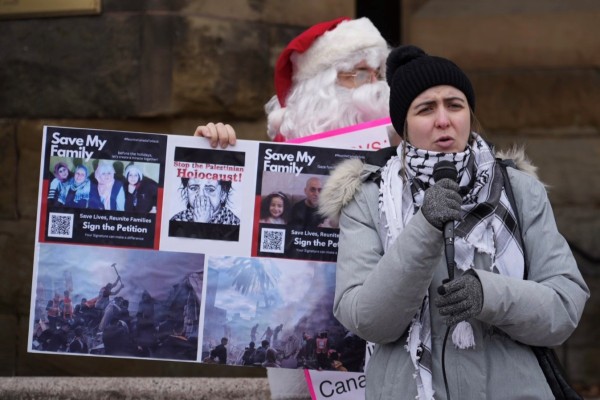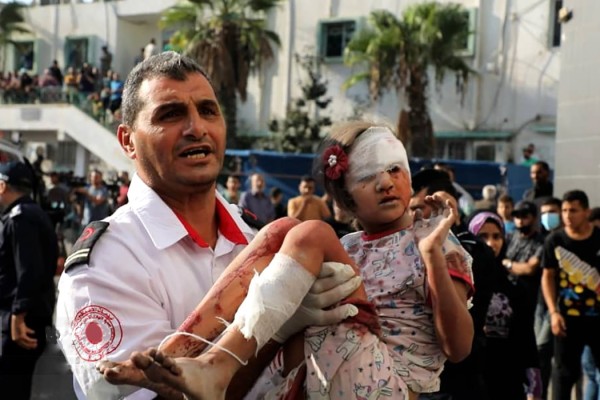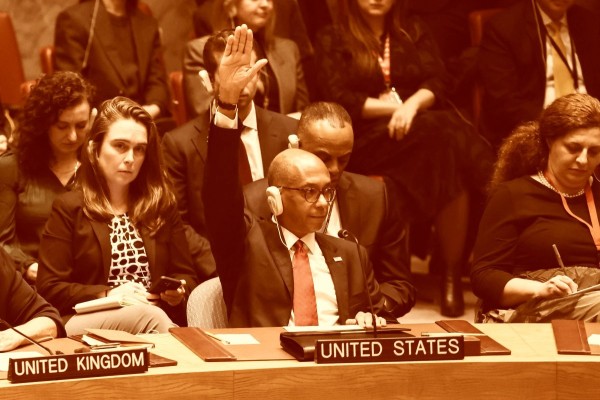The intensity of Israel’s war crimes in Gaza is barbaric and shocking, but its methods are not new
This latest criminal campaign dispels any lingering doubt that Israel’s real intent is to destroy the Palestinians’ will to live

Palestinians transport the injured to the Indonesian Hospital in Jabalia, north of the Gaza Strip on October 9, 2023. Photo courtesy Palestinian News & Information Agency-WAFA/Wikimedia Commons.
For nearly 75 years, the agony of the Palestinians has been unfathomable to an international audience. The exodus, the dispossession, the daily indignity of Israeli occupation and the extreme violence against innocents have largely been hidden to outsiders.
More than 20 years ago, during the Second Intifada, I briefly witnessed the grim reality of life in Gaza where the Israeli army used bulldozers to routinely raze vast swaths of agricultural land, destroying livelihoods and leaving hundreds of thousands of Palestinians undernourished.
In late 2000 and early 2001, Israel intentionally fuelled the suffering by preventing the United Nations from delivering food and medicine to Palestinians for months on end. Like mobsters lording over Gaza’s airspace and shorelines, Israeli officials imposed lengthy, unreasonable security checks of UN containers at Israel’s Ashdod Port and the Karni Crossing into the Gaza Strip, and demanded the UN pay hundreds of thousands of dollars in storage and handling fees before these emergency supplies could be delivered. The relief aid in these containers included artificial limbs for victims of Israeli bombings and materials to repair refugee shelters that had been destroyed. The Israeli army bulldozed pipelines and destroyed water wells. Back then, as now, Palestinians had depleted and contaminated water.
In 2002, in the West Bank, the Israeli army used tanks, commando forces and assault helicopters to shell the Jenin refugee camp with artillery and missiles. It claimed the camp was being used by terrorists to launch attacks against Israeli civilians. CNN initially reported that 500 civilians were killed during the 10-day siege but Palestinian officials claimed that 900 people, many of them women and children, were slaughtered.
As a journalist working for Agence France-Presse at the beginning of the Second Intifada, I chronicled earlier attacks by Israel on Palestinian refugee camps such as Khan Yunis, where Israeli tanks from the nearby Gush Katif Jewish settlement bloc rolled in, killing scores of Palestinians and wounding dozens more. Israeli gunners shot several Palestinians in the head, exploding their skulls, while survivors had shrapnel wounds all over their bodies. At Nasser Hospital, victims’ families wailed in grief at the sight of their loved ones. Two hours after this ground assault, while I was speaking to Palestinian children and Red Crescent workers at Khan Yunis, an Israeli sniper at a nearby outpost unleashed a torrent of gunfire on all of us. We scrambled for cover in the alleys between battered buildings. The soldier continued to shoot at us as we ran. One of the bullets hit a cement block above our heads in the alley as we crouched in fear. I wore a helmet and a bullet proof, press-labelled vest. The others had no protection whatsoever.
Weeks before this incident, an Israeli soldier shot a photographer with the Associated Press news agency in her abdomen and pelvic area while she was taking pictures in Gaza. She survived but her ovaries were obliterated. Israel’s killing of at least 39 journalists and media workers over the last month is viewed as unprecedented yet Israel has always targeted reporters bearing witness to crimes. The Committee to Protect Journalists said earlier this year that at least 20 journalists were killed by the Israeli army in the past 22 years, 18 of them Palestinian and two of them correspondents from Europe. The Palestinian Ministry of Information put the number higher, saying Israeli forces had previously killed 45 journalists since 2000.
Israeli civilians have also suffered immeasurably during these intractable wars. They live in daily fear of rocket attacks and other vicious paroxysms. I will never forget the carnage in the northern city of Hadera in November 2000 when a car bomb strategically exploded just as a packed commuter bus was driving by. The explosion killed at least two people and injured 55 more, including an 18-month-old baby. One woman lost both her legs. Rescue workers were picking up body parts when I arrived at the scene. The smell of smoke, burnt metal and revenge hung heavy. A group of young men on a balcony near the explosion raised their fists and shouted: “Death to Arabs.”
In any moral world, the perpetrators of these harrowing atrocities—both Hamas and Israeli officials—would be punished in a court of law, especially now as the unfiltered images of children in Gaza with perforated limbs and third degree burns are splashed across social media and our TV screens. The evidence is there for all to see. But the reality is that Israel did not sign the Rome Statute that established the International Criminal Court (ICC) and is therefore likely not subject to its authority. The United States has always protected Israel in any case, vetoing resolutions at the Security Council that condemn the Jewish state. Israel and the US have refused to ratify a key protocol of the Geneva Convention which outlaws indiscriminate attacks on civilian populations, and the destruction of food, water, and other materials needed for survival. While the ICC has ruled that it has jurisdiction for prosecuting crimes in Gaza, the West Bank and East Jerusalem, the court’s detractors say that Palestinians do not qualify as a sovereign state and Hamas is a non-state group that is considered a terrorist organization.
With evidence mounting that Israel may be committing genocide against Palestinians, it is possible that the US, UK, Canada and other nations that sell Israel weapons and refuse to call for a ceasefire could be liable for aiding and abetting violations of international humanitarian law. More than 20 years ago, when I witnessed Israel’s systematic crimes against Palestinian civilians, I could not help but wonder whether Israel’s real intent was to destroy the Palestinians’ will to live. Tragically, this latest criminal campaign dispels any lingering doubt.
Judi Rever is a journalist from Montréal and is the author of In Praise of Blood: The Crimes of the Rwandan Patriotic Front.










